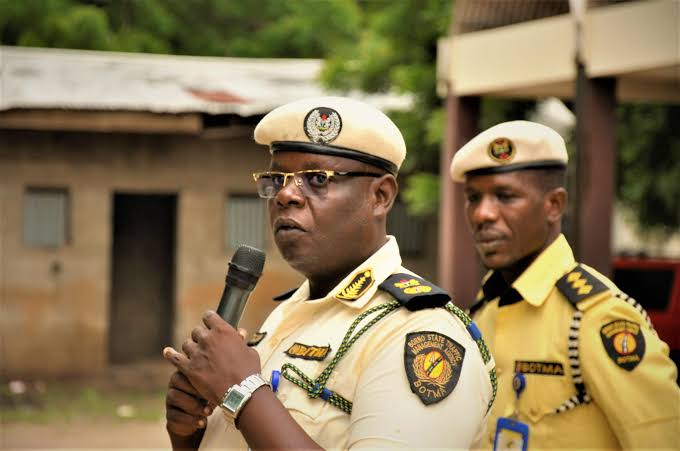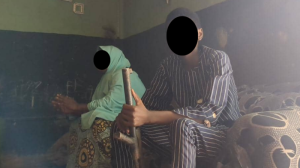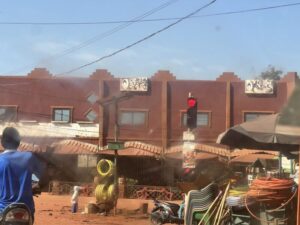Tricycle operators in Borno and Yobe States have expressed concerns over the conduct of state road marshals. In Maiduguri and Damaturu cities, tricycles, commonly referred to as Keke Napep, are the lifeblood of the cities’ transport system. These three-wheeled vehicles are not only a vital means of commuting for residents but also a significant source of employment, particularly for the youth.
However, despite their importance, Keke Napep operators face numerous challenges, especially from traffic management authorities. Interestingly, women typically emerge as owners rather than operators of these tricycles.
Despite its economic benefits, the tricycle business faces several challenges, particularly from the Borno Traffic Management Agency (BOTMA) and its Yobe State counterpart YOROTA (Yobe State Road Transport Authority).
Kanempress observed that in Borno State, BOTMA has been at the center of ongoing grievances among tricycle operators.
Ibrahim Musa, a 24-year-old Keke Napep operator, shared his experience, stating that while BOTMA’s efforts to reduce traffic congestion and ensure safety are commendable, the enforcement tactics employed by some of its personnel often seem harsh.
“There are times when we are stopped and fined for what we consider minor offenses, like stopping to drop off passengers in a spot with no designated parking, simply because there’s no available space,” he explained. Ibrahim Musa, a tricycle operator, shared his frustrations during an interview with our correspondent.
He highlighted the absence of designated parking spaces on most roads as a significant issue, pointing out that many roads lack shoulders for safe parking. However, his primary concern was the conduct of BOTMA personnel, whom he claimed frequently apprehend them whenever they stop to pick up or drop off passengers.
While Musa acknowledged BOTMA’s efforts in reducing traffic congestion and curbing reckless driving among tricycle operators, he criticised the agency for enforcing daily ticket payments even on non-working days.
He, however, recounted a personal experience where he was fined N5000 (five thousand Naira) for allegedly parking incorrectly, despite adhering to the rules.
Another rider, Mallam Abdullahi, echoed these sentiments, describing BOTMA as a stumbling block to their operations. He accused the agency’s personnel of hiding in strategic locations to catch riders off guard and issue fines for minor infractions.
According to him, this practice severely hampers their ability to work effectively.
Muhammadu Saleh, another keke Napep operator, accused some BOTMA officials of soliciting bribes and threatening to apprehend riders if their tricycle documents were nearing expiration.
Despite these complaints, there are those who appreciate the efforts of the government in maintaining traffic discipline.
In neighbouring Yobe State, Damaturu Keke Napep riders have a more positive outlook on their interactions with the Yobe State Road Transport Authority (YOROTA).
A young operator, who chose to remain anonymous, praised the state government under Governor Mai Mala Buni for its commitment to ensuring that traffic laws are respected and that all road users, including tricycle operators, adhere to these regulations.
“The government has really made efforts to bring sanity to our roads, and this has benefited both the riders and the passengers. The rules are clear, and if you follow them, you have nothing to worry about,” he said.
Another Keke Napep operator from Damaturu, Muhammad Saleh, aged 21, echoed these sentiments.
He expressed frustration over what he described as the “unnecessary harassment” by YOROTA road marshals for minor infractions.
“Sometimes, we are penalised for simply picking up passengers in areas where there’s no clear sign indicating a restriction. It feels like they’re more focused on catching us out than helping to maintain order,” Saleh lamented.
He also mentioned that some marshals demand bribes, particularly when they sense that the tricycle documents are about to expire, adding to the financial burden on the operators.
Another rider from Potiskum added, “We sometimes face challenges with the road marshals, especially when there’s heavy traffic, and we are forced to make quick decisions that might technically be against the rules. But overall, the enforcement here feels fairer, and there’s an understanding that we’re all just trying to make a living.”
The sentiment in Maiduguri, however, remains more critical, with many riders feeling that BOTMA’s enforcement could be more balanced.
A veteran Keke Napep rider in Maiduguri, Abdullahi Bukar, acknowledged that while some operators may not always adhere to parking regulations, the approach of hiding to catch offenders is not conducive to a fair system.
“We believe in maintaining order on the roads, but it should be done transparently. Catching riders off guard only breeds mistrust,” Bukar stated.
Responding to the concerns, BOTMA’s General Manager, Engineer Baba Shehu Tijjani, defended the agency’s actions, asserting that their primary goal is to ensure road safety and reduce congestion.
He encouraged tricycle operators to report any corrupt practices among BOTMA personnel, assuring that the agency is committed to upholding the law and addressing any misconduct.
“We have disciplined some of our officers in the past based on complaints with solid evidence, and we will continue to do so,” Tijjani assured.
Meanwhile, some tricycle operators in Yobe State also expressed frustration with YOROTA officials, alleging extortion and harassment. According to operators, YOROTA officials demand unnecessary fees of up to N40,000 or N20,000, forcing them to pay.
This has led to financial struggles for many, who already find it difficult to feed their families due to daily or weekly fees paid to tricycle owners. The operators claim that YOROTA personnel harass them, imposing excessive fines for minor infractions and ordering fresh registration.
One operator, Umar Abubakar, expressed his concerns, stating, “YOROTA officials should be called to order. They extort money from us and create unnecessary charges. Many operators struggle to feed their families, and these tricycles are not ours; we pay daily or weekly fees to the owners.”
Another operator, Ibrahim Tijjani, echoed similar sentiments, emphasising the need for YOROTA to focus on its primary responsibilities rather than exploiting operators.
The operators’ plight highlights the need for accountability and reform within YOROTA. By addressing these concerns, the agency can better serve its purpose and improve the lives of tricycle operators in Yobe State.
As tricycle operators in Borno and Yobe States explore the complexities of their trade, there is a clear need for ongoing dialogue between the authorities and the riders. While traffic regulation is crucial for the safety and orderliness of the roads, fair and transparent enforcement practices are equally important to ensure that those trying to earn an honest living are not unduly burdened.



